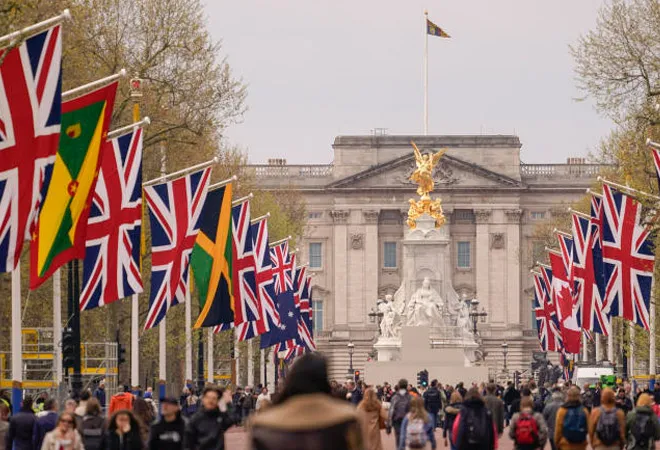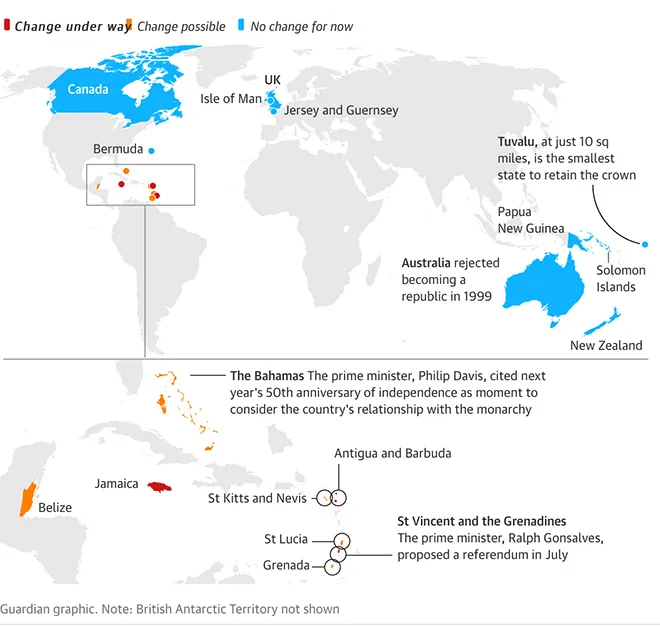
In a show of British pomp and pageantry, on 6 May 2023, Charles III was
crowned the King of the United Kingdom and the Commonwealth realms, marking a new era for the monarchy. His mother, Queen Elizabeth II acceded as the monarch of seven independent nations and reigned over an era of decolonisation. He succeeded her as the monarch of the Commonwealth realm; at a time when the Crown’s relevance and viability are being questioned.
The Commonwealth realm is a grouping of 16 sovereign states—predominantly former colonies of the British Empire that recognise the British monarch as their head of state. Although some countries within the realm have attempted to transition to republicanism (where citizens elect their own head of state) in the past, only a few have succeeded.
Barbados became the most recent country to become a republic in 2021, about 29 years after Mauritius which became one in 1992. Today, inspired by Barbados, several nations, especially in the Caribbean, have begun showing their interest in a similar transition with Belize, The Bahamas, Saint Vincent and Grenadines, and Jamaica, all showcasing their renewed interest in republicanism. Evidently, Charles III has cause for concern as these voices have only grown stronger since the passing of Elizabeth II, with Jamaica being the most vocal one of all.
 (The Commonwealth realms as the Queen left them | Source: The Guardian)
(The Commonwealth realms as the Queen left them | Source: The Guardian)
The Jamaican case
The Jamaican intention to become a republic was delivered to Prince William, and his wife Catherine during their March 2022 tour of the Caribbean. Jamaican Prime Minister, Andrew Holness
informed the royals that Jamaica is “moving on” with an intention to “fulfill our true ambitions and destiny as an independent, developed, prosperous country”. Whilst the tour was intended to be an example of the royal family and Britain reaching out to their allies in the Caribbean, it was marked by
protests in many of the host nations.
In June 2022, the Jamaican government
officially announced its intention to become a republic by 2025. This was followed through with the creation of a new ministry, the Ministry for Legal and Constitutional Affairs, which established the Constitutional Reform Committee.
If this transition takes place, Jamaica will remain members of the Commonwealth, but elect their own head of state and oversee their own domestic and foreign affairs—like India. The process will not be easy, with amendments needed in 13 legal provisions of the Constitution and larger processes involving cross-party consensus and electoral support at the referendum. And it is, indeed, this commitment to a complicated process that should worry the crown, and by extension—the United Kingdom (UK).
Jamaica will remain members of the Commonwealth, but elect their own head of state and oversee their own domestic and foreign affairs—like India.
Jamaica’s intentions are encouraged by its history. Jamaicans argue, like several other former colonies, that in their 300-year period of being colonised, their resources—both man and mineral—were taken away from them to make Britain prosperous. They also highlight the long history of racism. Over the years their ask has been simple. An apology and acknowledgement from the crown for the atrocities inflicted upon them and reparations for the profits stolen from them.
It is only in recent years that the British royal family has begun to acknowledge its actions. At a ceremony to replace the monarch as head of state in Barbados in 2021, Charles (the then Prince of Wales), acknowledged the
“appalling atrocity of slavery” that “forever stains our history”. His son, Prince William in 2022, went a step further at a dinner hosted by the Governor General of Jamaica to speak of his
“profound sorrow” saying that slavery “should have never happened” and “forever stains our history”. However, an official apology is yet to be seen.
Jamaica's desire to transition from a Commonwealth realm to a republic may also stem from its experiences with the UK in recent years. In 2003, the British government changed immigration rules, suspending visa-free access for Jamaicans and making them the only Commonwealth citizens who require a visa to visit the country where their head of state resides. In 2015, the
Windrush scandal under the leadership of then Prime Minister David Cameron and then Home Minister Theresa May worsened issues with many Commonwealth citizens being wrongly deported to cut down on illegal immigrants. Because of the fear of being wrongly singled out, many Commonwealth citizens in the UK stopped accessing healthcare and education. The worst perhaps was PM
Cameron’s visit to Jamaica in the same year, where he spurned calls for an apology. In lieu of reparations, he announced that Britain would contribute towards the building of a new prison in Jamaica, one that he hoped would house the Jamaicans who were deported for committing crimes in the UK.
In 2003, the British government changed immigration rules, suspending visa-free access for Jamaicans and making them the only Commonwealth citizens who require a visa to visit the country where their head of state resides.
Compare commitments for jails to enthusiastic commitment to all-around development by other nations – especially by China. As a part of the Belt and Road Initiative (BRI), over US$ 3 billion of Chinese direct investment in BRI and non-BRI projects have flown into Jamaica, including US$ 600 million towards the construction of a 67-km highway that would link North and South Jamaica.
A new era for Britain and Britannia
Although the British royal family no longer holds political or executive roles in the UK, the sovereign, as the Head of State, plays an essential role in ceremonial and diplomatic duties. The monarchy is also an integral part of British soft power, often more recognisable than the British Prime Minister in many parts of the world. The coronation ceremony in itself is an easy example of this soft power. The ceremony had in attendance diplomatic representation from across the world including leaders from Poland, the Philippines, Australia, the European Union, Sri Lanka, the Seychelles, Singapore, Pakistan, Nigeria, Malawi, Maldives, Bangladesh, and New Zealand, to name a few. India was represented by its Vice President, Jagdeep Dhankhar. The evening before the coronation, a diplomatic reception was held where democratically elected global leaders mingled with the divinely ordained, with a picture released from the event showing the Ukrainian and American first ladies Olena Zelenska and Jill Biden posing for a photo with Catherine, the future queen; sending across a message on the Russia-Ukraine conflict. Few investitures (if any), enjoy this level of global visibility, not just in diplomatic circles but also on social media which saw people all across the world tune in.
As such, the monarchy serves as non-political ambassadors for the UK, receiving dignitaries and making visits to represent “Brand Britain”. The late Queen Elizabeth II herself visited over 100 countries during her reign. For the UK, their neutral stance on politics allows them to remain relevant across various political administrations domestically, allowing other countries to have a long-term and unchanging bridge to the UK, and allowing the former to advance their national interests which would have otherwise been limited by politics. For example, during the Brexit negotiations, several senior members of the royal family visited European countries to maintain and show interest in their ties with their respective countries, even though the UK was no longer part of the European Union.
The rejection of the Commonwealth realm by countries transitioning to republicanism is a stark reminder of the diminishing strategic influence of the UK in the global order.
Although the other 15 Commonwealth realms enjoyed equal stature during the commonwealth, including their flags on public display at the entrance of Westminster Abbey as a significant part of the ceremony, the rejection of the Commonwealth realm by countries transitioning to republicanism is a stark reminder of the diminishing strategic influence of the UK in the global order. As seen with Jamaica's recent vocal interest in republicanism, historical linkages no longer excuse the actions of the UK government, and the UK is rapidly losing its long-held prime position in several countries.
While Shakespeare famously suggested that “uneasy lies the head that wears a crown,” it appears that Prince Charles is acutely aware of the declining influence of the British monarchy. At the 2022 Commonwealth Heads of Government Meeting held in Kigali, Rwanda, Charles III, who was then just months away from becoming King,
stated that “each member's constitutional arrangement, whether it be a republic or monarchy, is purely a matter for each member country to decide,” emphasising the importance of the enduring relationships between Commonwealth nations. As Charles faces a commonwealth conundrum and Jamaican farewell, it is his leadership that will significantly shape, if not decide, the role that the Monarchy will have to play in moulding Britain's global influence in the coming years.
Sitara Srinivas is a Junior Fellow with the Strategic Studies Programme at ORF.
The views expressed above belong to the author(s). ORF research and analyses now available on Telegram! Click here to access our curated content — blogs, longforms and interviews.



 In a show of British pomp and pageantry, on 6 May 2023, Charles III was
In a show of British pomp and pageantry, on 6 May 2023, Charles III was 
 PREV
PREV

